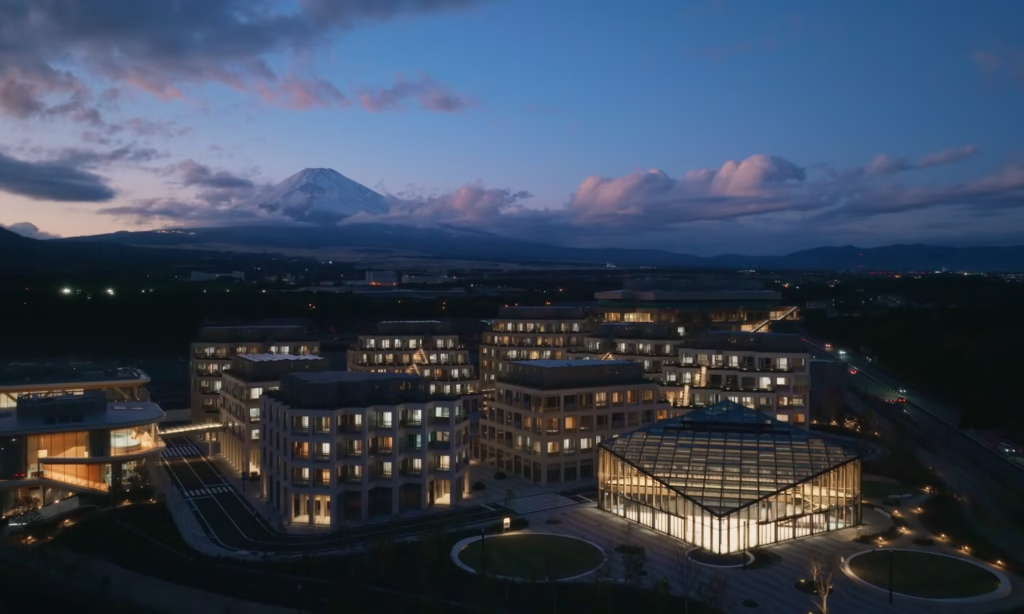LAS VEGAS — Toyota Woven City, an essential element of the automaker’s ambitious strategy to transform into a mobility enterprise and serve as a “prototype town of the future,” is set to receive its first inhabitants in the upcoming fall season.
Toyota Motor Corporation Chairman Akio Toyoda announced that the initial phase of construction for Woven City has been finalized, with plans to welcome its first residents as soon as this fall. The inaugural group of 100 residents will consist mainly of Toyota employees and their families, as the company embarks on this innovative project.
Toyota ‘Woven City’ has achieved significant milestones since its groundbreaking ceremony on February 23, 2021
At the former location of Toyota Motor East Japan’s Higashi-Fuji Plant in Susono City, Shizuoka Prefecture, Japan. The construction of the Phase 1 buildings, designated for initial co-creation activities, was finalized in October 2024. Preparations for the official inauguration are currently in progress.
Phase 1 of Woven City has been acknowledged for its environmentally sustainable and human-centered design, which seeks to improve the overall quality of life for its inhabitants. It has received Japan’s inaugural LEED for Communities Platinum certification, the highest accolade within this certification system.
In conjunction with the preparations for Phase 1, renovations are taking place at a former TMEJ Higashi-Fuji Plant facility to transform it into a manufacturing hub for Woven City, while site preparation for Phase 2 has also begun. Insights gained from Phase 1 will inform the development of Phase 2 and subsequent phases, continually enhancing the functionality of the test course.
Woven City serves as a testbed for mobility, where “Inventors” committed to serving the greater good can create, test, and validate innovative products and services. These inventors include Toyota and its affiliated companies, such as WbyT, as well as external firms, startups, and individual entrepreneurs. By harnessing Toyota’s extensive manufacturing experience and WbyT’s software expertise, Woven City provides a distinctive environment equipped with the necessary tools and services to address societal challenges and generate future-oriented value. Through collaboration among inventors and input from residents and visitors, Woven City aspires to foster innovation and contribute to a better future.
Woven City is actively engaging in ongoing discussions with previously announced partners, including ENEOS Corporation, Nippon Telegraph and Telephone Corporation (NTT), and Rinnai Corporation.

In addition, an accelerator program is set to commence in the summer of 2025, inviting external startups, entrepreneurs, universities, and research institutions to participate in Woven City.
Residents and visitors will hold an equally significant position alongside inventors within Woven City. Referred to as ‘Weavers,’ these individuals are united by their enthusiasm for the ‘expansion of mobility’ and their dedication to fostering a more prosperous society. Through their involvement in co-creation initiatives, Weavers will help unlock the full potential of Woven City.
At the official inauguration of Woven City, anticipated to begin in the fall of 2025 or later, around 100 residents—primarily staff from Toyota and WbyT along with their families—are expected to engage in co-creation activities as the inaugural residents. The community will gradually grow to include external inventors and their families. The first phase is expected to accommodate approximately 360 residents, with the overall population, including subsequent phases, projected to reach around 2,000. Initially, access for visitors will be restricted to related parties, with plans to invite the general public to join as Weavers in co-creation activities starting in fiscal year 2026 or later.
Woven City functions as a testing ground for Toyota’s evolution into a comprehensive mobility enterprise. In collaboration with WbyT, Toyota seeks to transform the concept of mobility, broadening its definition to include the movement of individuals, goods, information, and energy, ultimately benefiting both individuals and society at large. This city is designed with a human-centric approach, placing its inhabitants—Inventors and Weavers—at the forefront to explore new opportunities in the collective aim of achieving “Well-being for All.” Furthermore, with aspirations to extend mobility beyond terrestrial, maritime, and aerial domains into outer space, WbyT has announced an investment in Interstellar Technologies Inc. and intends to utilize Toyota’s expertise to facilitate the mass production of rockets.
You may also like
Latest jobs & career opportunities in emerging technologies